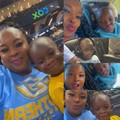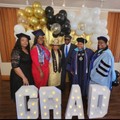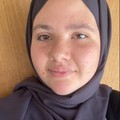The first time I saw Amir, he was crying under a desk. It was a typical Monday morning in my pre-K classroom at Cleveland Avenue Elementary School in Atlanta, Georgia, and while most of the students were singing the alphabet song, Amir was curled in a ball, hands pressed tightly over his ears, tears rolling down his cheeks. He had just turned four, and like many children in our neighborhood, he was carrying a weight too heavy for someone so small. His father had been incarcerated two weeks earlier, and since then, he had barely spoken in class. That day, I learned that sometimes the most important thing an educator can do is simply show up, every single day, with love.
As a Literacy Development Fellow through the Leading Men Fellowship, I was tasked with delivering daily, research-backed literacy interventions to pre-K students. But from the moment I met Amir, I knew that phonemic awareness and print knowledge couldn’t come before safety and trust. Education is not only about learning letters and numbers; it is about cultivating a sense of belonging and self-worth—especially for Black boys like Amir, who are so often misread, mislabeled, or overlooked.
I started by just sitting beside him during story time, not forcing interaction, just being present. I’d bring two books—one for him, one for me—and quietly model how to turn the pages, follow along with the words, and make silly voices for characters. Some days he would scoot a little closer. Other days he wouldn’t move at all. But I stayed consistent. After a week, he reached out and tapped my book, asking softly, “What’s his name?” referring to a character on the page. That was the beginning.
Over time, I built a one-on-one routine for Amir. We’d start each day with a sensory activity to help him feel calm—Play-Doh, water beads, or tracing letters in kinetic sand. Then I’d introduce a literacy skill using games and songs tailored to his interests—especially dinosaurs and superheroes. When we practiced rhyming words, I turned it into a game where “Spider-Man had to find the right rhyme to save the city.” When we worked on letter recognition, I turned each letter into a superhero symbol. He wasn’t just learning—he was leading.
Slowly, Amir began to change. He started participating in group story time. He began raising his hand during our “letter of the day” circle. And most memorably, during one of our weekly assessments, he proudly pointed to the word “dog” and read it aloud. He looked up at me with eyes wide and said, “Mr. DaQuan, I did it!” I smiled and replied, “You did. Because you can.” His response is one I’ll never forget: “You believe in me, so I believe in me.”
That was the moment I knew I was living my purpose.
It would be easy to talk about literacy gains and data points—Amir went from recognizing 4 uppercase letters to 20, from knowing no letter sounds to identifying 18 out of 26. But the real growth was internal. He began to walk taller. He smiled more. His meltdowns became rare, and his curiosity flourished. And perhaps most telling of all—he began helping other students with their letters, saying things like, “You just gotta try. That’s what Mr. DaQuan says.”
I didn’t just help Amir learn to read. I helped him see himself as a reader, a thinker, and a capable learner.
This experience deeply affirmed my belief that when children—especially Black boys—are met with patience, joy, and high expectations, they rise. So often, boys like Amir are punished for their pain rather than supported through it. They are suspended for crying instead of counseled. They are written off as behavior problems before they are even given a chance to show their brilliance. That’s why I center my work on affirming, healing, and challenging my students to see themselves as scholars.
Amir is one of many children I’ve worked with who have changed me. Each of them reminds me that impact doesn’t come from standing in front of a classroom—it comes from standing beside a child, day after day, even when it's hard. It comes from knowing that the smallest moments—a shared book, a silly song, a high five—can ripple into something powerful. It comes from knowing that literacy is liberation.
My work with Amir also inspired me to write and publish Just Like You!: ABC Edition, a book that affirms the identities and possibilities of Black boys through joyful imagery and empowering language. I’ve distributed it to classrooms across Atlanta and hope to expand it further. Because every child deserves to see themselves reflected in stories that say, “You matter. You are brilliant. You belong.”
As I prepare to enter the classroom full-time after completing my master’s in Urban Education Policy at Brown University, I carry Amir’s story with me. It reminds me that the work is urgent and personal. That every child I meet might be one caring adult away from believing in their own potential. And that while we may not be able to change everything overnight, we can change the world one child at a time.
Sometimes, all it takes is one person saying, “I see you.” I was that person for Amir—and because of him, I’m more determined than ever to be that person for many more.
A Voice for My Niece: Standing Up for a Child Who Couldn’t Speak for Herself
The moment my niece stepped through the door after a weekend visit with her father, something was different. Her shoulders were slumped, her eyes downcast, and her once-vibrant spirit was barely present. She clung to me without saying a word, but her silence screamed volumes. That was the day I realized she was suffering—and that I had a choice: to turn a blind eye, or to step in and become the voice she was too afraid to use.
At just eight years old, my niece began showing clear signs of trauma—sudden anxiety, withdrawn behavior, trouble sleeping, and fearfulness after returning from visits to her father and his live-in girlfriend. When we gently asked her what was wrong, she would whisper, “I can’t tell. I’ll get in trouble.” That simple sentence shattered my heart and lit a fire within me. I knew something was wrong, and I couldn’t ignore it.
From that day on, I made it my mission to protect her. I began carefully documenting everything—her behaviors, changes in mood, and any statements she shared. I connected with her teachers and school counselor, who confirmed they had noticed similar red flags. Most importantly, I worked to rebuild her trust, letting her know every single day that she was safe, she was loved, and she had every right to be heard.
Eventually, we had to go to family court for a custody hearing. It was one of the most emotional and difficult days of my life. My niece was terrified to speak up, worried she wouldn’t be believed. I held her hand and promised her: “You don’t have to do this alone. I’ve got you.” I testified on her behalf and shared everything I had gathered. Combined with her counselor’s professional observations, the judge ruled in favor of protecting her—granting full custody to her mother and limiting the father’s visits to supervised time only. She was also given access to counseling services to begin her healing journey.
Today, my niece is thriving. She laughs again. She’s sleeping through the night. She’s learning to trust, to speak, and to feel safe in her own skin. And while that chapter of her life was incredibly painful, it reminded me just how powerful advocacy can be—especially for children who haven’t yet found their voice.
That experience didn’t just change her life; it changed mine. It solidified my passion for working with children and deepened my desire to serve as a safe, supportive presence in their lives. I’ve realized that protecting children is more than just a role—it’s a calling.
This is why I’m pursuing a future in education. Schools are more than just places where students learn math and science; they are environments where emotional safety and personal development are just as important as academics. If I could change one thing in education, it would be to ensure every school has trained child advocates, counselors, and trauma-informed staff. Far too many children suffer silently, and educators are often their first—and sometimes only—line of defense. We need to be equipped not just to teach, but to listen, to observe, and to intervene.
Receiving this scholarship would help me continue my path toward becoming an educator and advocate who stands up for children—not only in the classroom, but in every space they exist. I want to be the adult I once needed, and the one my niece found in me: someone who sees the signs, asks the hard questions, and stands firm in love, truth, and protection.
In the end, making a difference doesn’t require superpowers—it requires compassion, courage, and commitment. My niece showed me that even one caring adult can change a child’s entire world. And with the help of this scholarship, I intend to be that adult for many more children to come.






































































